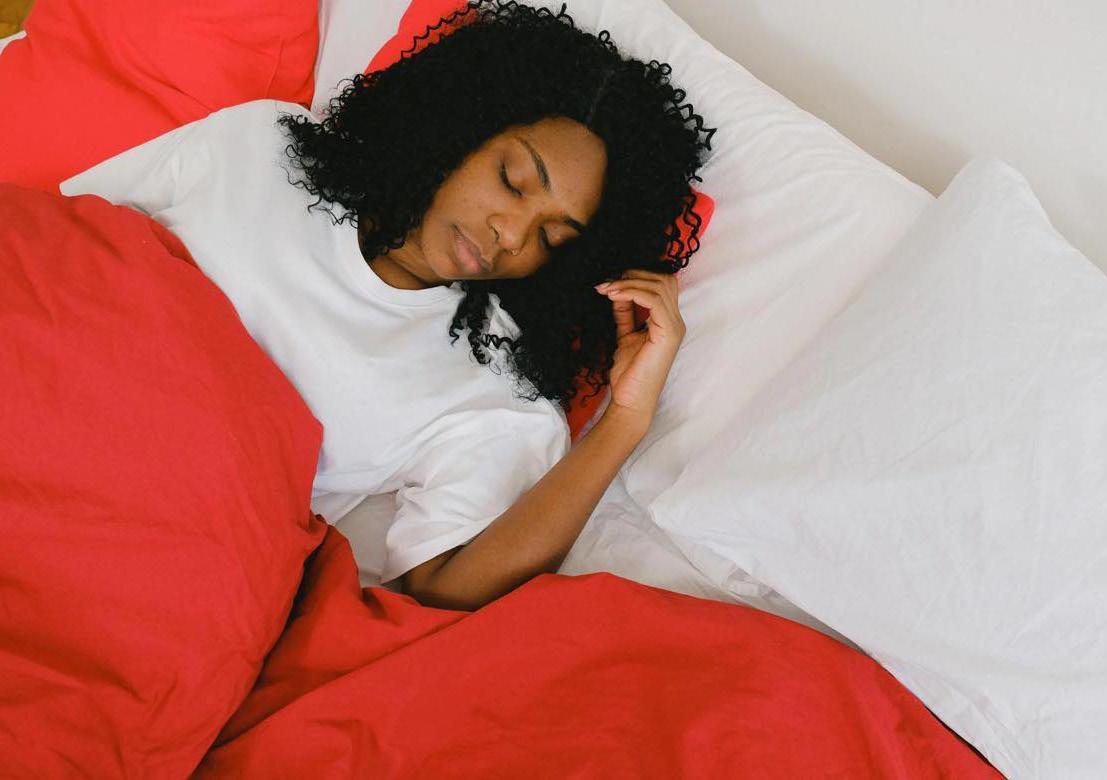
5 minute read
OP-ED: HOW POOR SLEEP HABITS AFFECT WOMEN’S HEALTH AND WELL-BEING
By Megan Freeman
Many people are unaware that tossing and turning at night or lying awake for more than 30 minutes can lead to serious health issues in women. The Sleep Foundation estimates that women are 40% more likely than men to experience insomnia during their lifetimes. Insomnia can negatively impact health and wellbeing, impair a person's ability to perform daily tasks and affect their relationships and overall quality of life.
Did you know that sleep deprivation can lead to higher insulin and blood sugar levels, increasing the risk of Type 2 diabetes? According to a survey by the National Sleep Foundation, two-thirds of women reported experiencing sleep problems several nights a week monthly. Sleep deprivation has also been linked to an increased appetite.
A Duke Health study found that women who are poor sleepers tend to be more overweight than men with similar sleep problems. Women have long faced body image issues, exacerbated by media portrayals that suggest they must look a certain way and maintain a specific body weight. Today, with the influence of supermodels and plastic surgery enhancements, these pressures can lead to selfimage issues.
When women feel they do not "fit the bill," it can result in sleep loss, weight gain and episodes of depression. Who knew that poor sleep could be so dangerous, making women more susceptible to a range of troubling health issues? For example, studies show that about twice as many women as men will experience depression in their lifetime.
Menstrual cycle issues can also disrupt sleep patterns in both women and teen girls. Cramping and bleeding can affect sleep and mood. According to UT Southwestern Medical Center, hormonal changes in teen girls can make them feel sleepy, while natural sleep cycle shifts signal their brains that they need less sleep. Although teens don't require as much sleep as children, they still need adequate rest to perform well in school, maintain relationships and participate in extracurricular activities.
As we know, women's wellbeing is extremely important, and women generally need more sleep than men. According to

Baptist Health, due to the various changes women's bodies undergo, including monthly hormone fluctuations, pregnancy and menopause, women may need up to 20 minutes more sleep per night than men, which is significant.
Although certain non-habitforming medications are available, there are many non-medical options women can take to improve sleep habits. Even in the busy lives of women as caretakers, workers and barrier-breakers, they can follow these recommendations below from the Society of Behavioral Science.
• Keep a regular bedtime and wake-up time.
• Limit the activities you do in bed to just sleeping.
• Limit exposure to anxietyinducing news, pandemicrelated or otherwise.
• Exercise regularly during daylight hours.
• Spend some time each day in natural sunlight.
• Do some relaxing activities before bedtime, such as reading a book or doing yoga.
• Avoid looking at screens 30 minutes before bedtime.
• Eat your last food of the day 2 hours before bedtime to prevent sleep disruption and avoid drinking alcohol or caffeine.
• Only go to bed if you’re feeling sleepy.
• Keep the bedroom quiet, dark, and at a comfortable, cool temperature.
• If you nap during the day, limit the nap to only 30 minutes.
• Do not toss and turn. If you cannot fall asleep, get up and do a laid-back activity (like reading) in dim light until you start to feel drowsy.
Better sleep is something that can be worked on immediately. It will take time and effort to break poor habits, but ultimately it will lead to a healthier and happier life. Implementing good sleep hygiene practices, such as maintaining a consistent sleep schedule, creating a relaxing bedtime routine and making your sleep environment comfortable, can significantly improve your quality of sleep. Additionally, being mindful of your diet and exercise habits, as well as managing stress, can further enhance your sleep quality. By prioritizing sleep and making these changes, you can improve your overall well-being and enjoy the benefits of better rest.

Megan Freeman earned a Doctorate of Strategic Leadership Degree with a concentration in leadership coaching from Regent University. She is the founder, owner and CEO of Leadernificent LLC, an organizational development business.
Implementing good sleep hygiene practices, such as maintaining a consistent sleep schedule, creating a relaxing bedtime routine and making your sleep environment comfortable, can significantly improve your quality of sleep.
increasing the risk of Type 2 diabetes? According to a survey by the National Sleep Foundation, two-thirds of women reported experiencing sleep problems several nights a week monthly. Sleep deprivation has also been linked to an increased appetite.
Many people are unaware that tossing and turning at night or lying awake for more than 30 minutes can lead to serious health issues in women. The Sleep Foundation estimates that women are 40% more likely than men to experience insomnia during their lifetimes. Insomnia can negatively impact health and wellbeing, impair a person's ability to perform daily tasks and affect their relationships and overall quality of life.




